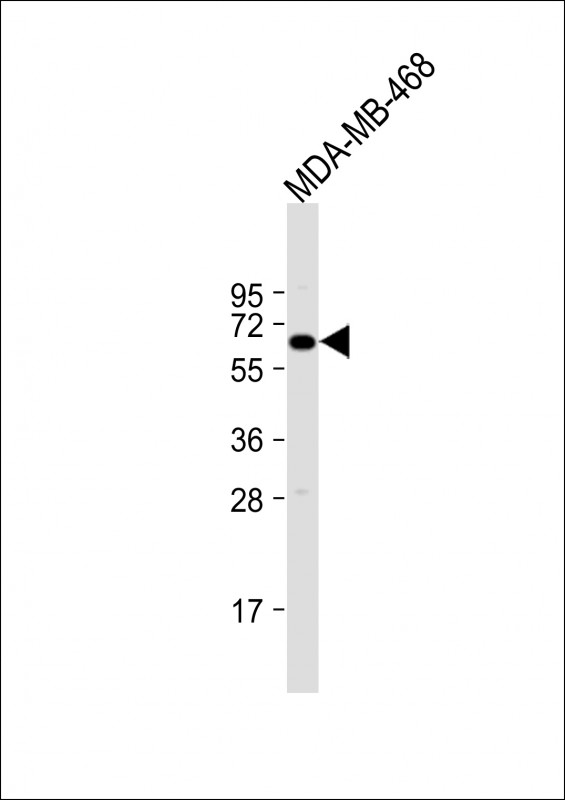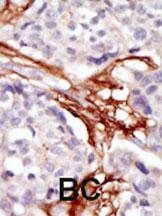

| WB | 1/1000 | Human,Mouse,Rat |
| IF | 咨询技术 | Human,Mouse,Rat |
| IHC | 1/100-1/500 | Human,Mouse,Rat |
| ICC | 技术咨询 | Human,Mouse,Rat |
| FCM | 咨询技术 | Human,Mouse,Rat |
| Elisa | 咨询技术 | Human,Mouse,Rat |
| Aliases | Tyrosine-protein kinase Yes, Proto-oncogene c-Yes, p61-Yes, YES1, YES |
| Entrez GeneID | 7525 |
| WB Predicted band size | 60.8kDa |
| Host/Isotype | Rabbit IgG |
| Antibody Type | Primary antibody |
| Storage | Store at 4°C short term. Aliquot and store at -20°C long term. Avoid freeze/thaw cycles. |
| Species Reactivity | Human, Mouse |
| Immunogen | This YES1 antibody is generated from rabbits immunized with a KLH conjugated synthetic peptide between 1-30 amino acids from the N-terminal region of human YES1. |
| Formulation | Purified antibody in PBS with 0.05% sodium azide. |
+ +
以下是关于YES1 (N-term)抗体的3篇参考文献,按文献名称、作者和摘要内容概括整理:
---
1. **文献名称**: *YES1 amplification confers trastuzumab-emtansine (T-DM1) resistance in HER2-positive cancer*
**作者**: A. Ham et al.
**摘要**: 该研究揭示了YES1基因扩增与HER2阳性癌症对T-DM1耐药性的关联。研究中使用YES1 (N-term)抗体通过免疫印迹和免疫组化验证了YES1蛋白在耐药细胞系及临床样本中的高表达,证实其作为治疗靶点的潜力。
---
2. **文献名称**: *Role of YES1 signaling in pancreatic cancer progression and metastasis*
**作者**: L. Chen et al.
**摘要**: 本文探讨了YES1在胰腺癌转移中的作用机制。通过YES1 (N-term)抗体进行免疫沉淀和蛋白质组学分析,发现YES1与EGFR信号通路相互作用,促进肿瘤侵袭性,为靶向干预提供了实验依据。
---
3. **文献名称**: *Development and validation of a YES1-targeted monoclonal antibody for functional studies*
**作者**: K. Tanaka et al.
**摘要**: 该研究报道了一种特异性识别YES1 N端表位的单克隆抗体的开发与验证。作者通过ELISA、免疫荧光和流式细胞术证明该抗体在多种肿瘤模型中的高亲和力和特异性,支持其在基础研究与临床诊断中的应用。
---
**备注**:若需更多文献,建议在PubMed或Web of Science中以“YES1 N-terminal antibody”及“kinase signaling”等关键词检索,或参考抗体供应商(如CST、Abcam)的产品说明书引用文献。
The YES1 (N-term) antibody is a specialized tool designed to target the N-terminal region of the YES1 proto-oncogene tyrosine kinase, a member of the SRC family of non-receptor tyrosine kinases. YES1 plays critical roles in cellular signaling pathways regulating proliferation, survival, adhesion, and differentiation. Dysregulation of YES1 is linked to cancer progression, metastasis, and drug resistance, particularly in solid tumors like lung, breast, and ovarian cancers.
This antibody is commonly used in research to detect YES1 expression and activation through techniques such as Western blotting, immunoprecipitation, and immunohistochemistry. By focusing on the N-terminal domain, it helps identify full-length YES1 or specific isoforms, aiding studies on its structural and functional interactions. Validated for specificity, it minimizes cross-reactivity with other SRC-family kinases, ensuring reliable results in both normal and pathological tissues.
Researchers employ the YES1 (N-term) antibody to explore oncogenic signaling mechanisms, evaluate therapeutic targets, and assess clinical correlations in cancer models. Its utility extends to biomarker studies, where YES1 overexpression often signals aggressive disease. Available as monoclonal or polyclonal versions, this antibody remains a key reagent in dissecting YES1's role in cellular homeostasis and disease.
×